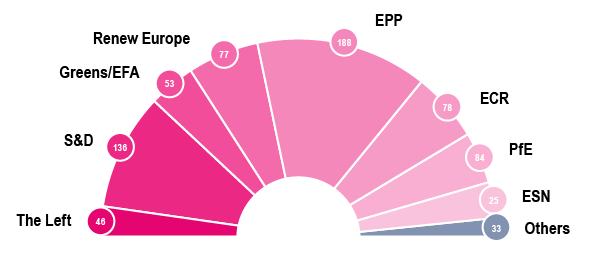
The European Green Deal
Current status and outlook
By Arthur ten Wolde – Head of Circular Future and Executive Director of Ecopreneur.eu

The European Green Deal (EGD) represents the EU’s plan to transform its economy towards sustainability, aiming for climate neutrality by 2050. This essay explores the current legislative status, political shifts since the 2024 elections, and the priorities of the new European Commission.
Especially: What will remain of the Green Deal?
Current status of the European Green Deal
Despite media scrutiny in 2024 for the successful farmers’ protest against the EU’s Farm to Fork Strategy and the watering down of laws due to lobbying, the EU has in fact adopted key legislative elements of the Green Deal under the previous term of Commission and Parliament:
|
|
Under the new term, the following laws were also passed:
Construction Products Regulation (CPR)
Ensures reliable information to compare the performance of products and enables Member States to define the legal requirements.
Single Use Plastics Directive (SUPD) “mass balance” method
Establishes a method to determine the recycled content, although risking an unlevel playing field for mechanical recycling.
Packaging & Packaging Waste Regulation (PPWR)
A new set of requirements that cover the entire packaging life cycle.
These regulations lay the groundwork for sustainable practices across energy, consumer goods, and other sectors, including renewable energy market reforms. A revised Waste Framework Directive for food and textiles is pending final approval by Council and Parliament, and the final Green Claims Directive is negotiated in Trilogue between the Council, parliament and Commission.
Political shift to the right
The 2024 European elections resulted in a political shift to the far-right, reflecting trends in Member States such as Hungary, Italy, the Netherlands, and Germany, where right-wing parties are slowing down climate policies. The rise of far-right groups like Patriots for Europe and Europe of Sovereign Nations, now holding over 100 seats in the European Parliament, is a challenge to Green Deal priorities. However, the centrist bloc, including Christian Democrats (EPP), Socialists and Democrats (S&D) and liberals like Renew Europe, has retained a majority, and remains committed to the green agenda. Renew Europe advocates for more ambitious initiatives like a Blue Deal to protect oceans, while S&D focuses on ensuring equity and a just transition.
Renewed Support for Green Policies
In early 2024, enthusiasm for green initiatives waned, with the focus shifting to competitiveness and innovation. However, a surprising resurgence occurred over the summer. Support for the Green Deal has also expanded beyond environmentalist circles. Former Italian prime ministers Letta and Draghi (also former European Central Bank president) endorsed the economic transition towards sustainability. Draghi’s report on competitiveness calls for €750-800 billion in annual investments to create green jobs and prevent European de-industrialisation. Meanwhile, extreme floods in Central Europe and wildfires in Southern Europe have highlighted the urgency of climate action.
New Priorities of the European Commission
The new European Commission's priorities reflect both continuity and adaptation. Key figures include Teresa Ribera (Spain, S&D) as Executive Vice-President for Clean, Just, and Competitive Transition; Stéphane Séjourné (France, Renew) for Industry and SMEs; Jessika Roswall, Commissioner for Environment, Water Resilience and a Competitive Circular Economy (Sweden, EPP), and Wopke Hoekstra (Netherlands, EPP) for Climate, Clean Growth, and taxation.
The Clean Industrial Deal, with ‘clean’ added by Von der Leyen to gain support from the European Greens’. is the Commission’s flagship initiative. It aims to decarbonise industries through investment and clean trade partnerships for critical raw materials and technologies. The ambitious 2040 Climate Target proposed by the previous Commission, aiming for a 90% reduction in net greenhouse gas emissions compared to 1990 levels, remains on the agenda. In addition, a new Circular Economy Act was announced. Meanwhile, the adopted Green Deal laws require numerous implementing and delegated acts from the Commission, alongside national legislative action and compliance measures.
So far, so good. But then, the new Commission launched a Competitiveness Compass including “simplification” of regulation as a key priority. It was rapidly followed by a Omnibus Simplification Package proposal prepared by Valdis Dombrovskis, Commissioner for Economy and Productivity, Implementation and Simplification, who is leading the Directorate General for Economic and Financial Affairs. His proposal severely weakens the existing rules for reporting (CSRD), due diligence (CSDDD), Financial Taxonomy and CBAM.
This example betrays an ideological deregulation agenda rather than a rational simplification.
Ecopreneur.eu regards the Omnibus proposal a major setback for sustainable business. Especially for reporting and due diligence, instead of reducing administrative burdens effectively, the package limits their scope, reduces the impact and value chain transparency, creates legal uncertainty, and discourages private investment. The most counterproductive proposal is the scrapping of mandatory sector-specific reporting standards. These standards actually simplify reporting by focusing on the largest impacts.

At the same time, sustainable frontrunners do understand the resistance of conventional companies to report on sustainability without a business reward. The previous Commission has overall failed to create a level playing field to make sustainable solutions profitable across the board.
Outlook and advocacy priorities of Ecopreneur.eu
The Green Deal therefore faces significant challenges, but it remains central to the EU agenda. Ecopreneur.eu, the European Sustainable Business Federation, highlights three priorities:
Ambitious implementation
Ensure robust enforcement of Green Deal regulations, and complete the framework with laws like the Green Claims Directive and agro-food sector regulations. The Omnibus proposal only emphasises the need to uphold the laws as much as possible.
Level playing field for sustainable solutions
To end unfair competition and create well-functioning European markets for sustainable products and services, introduce mandatory Green Public Procurement and economic incentives using levies and taxes.
Support for SMEs
Create Regional Circularity Hubs by 2027 to help small businesses, which contribute 60% of Europe’s CO₂ emissions and waste, transition to sustainable practices.
These measures are essential for achieving the Green Deal’s goal of a climate-neutral Europe by 2050 while balancing economic resilience, prosperity and social equity.
Conclusion
The European Green Deal continues to shape the EU’s legislative landscape. The Clean Industrial Deal, Circular Economy Act and 2040 Climate Target are backed by centrist and green coalitions. However, the Green Deal’s progress is challenged by forces within the new Commission and far-right opposition in the Parliament and Member States.
Ecopreneur.eu’s advocacy further strengthens the push towards a sustainable, competitive Europe.
References
Position papers. (2025, 13 March). Ecopreneur.eu. https://ecopreneur.eu/policies/positionpapers/
Ecodesign for Sustainable Products Regulation. (n.d.). European Commission. https://commission.europa.eu/energy-climate-change-environment/standards-tools-and-labels/products-labelling-rules-and-requirements/ecodesign-sustainable-products-regulation_en
A Clean Industrial Deal for competitiveness and decarbonisation in the EU. (2025, 26 Februari). European Commission. https://ec.europa.eu/commission/presscorner/detail/en/ip_25_550

